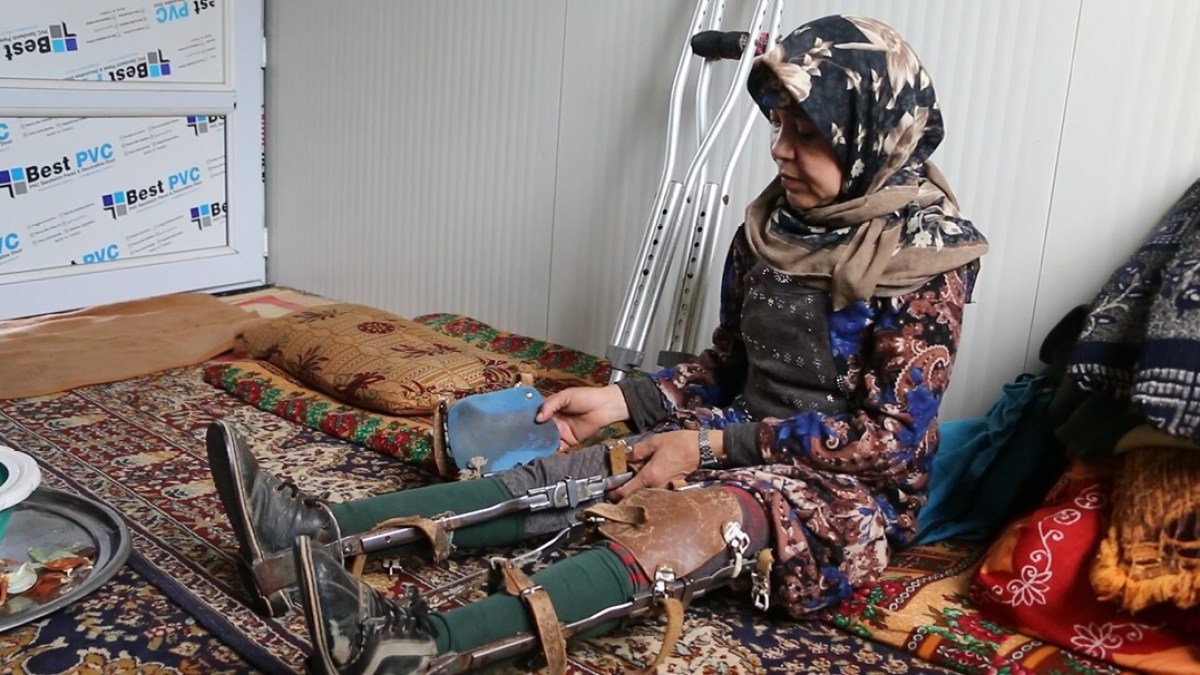play videoplay video
Video duration 04 minutes 41 seconds 04:41
Idlib -
Ghalia Muhammad's tears preceded her words, as she recalled her childhood and the pain she experienced when she was unable to walk like her fellow children, before she began treatment and performed surgical operations so that she could get up and stand on her feet.
But her joy was not complete, as she lost her mother, when she was 14 years old, and sadness returned to her again. Then, war soon became the greatest concern due to the fear she experienced in her town of “Um Nir” in the southern countryside of Idlib, as a result of the continuous bombing by warplanes and helicopters, until... A large shrapnel nearly killed her.
Ghalia narrates in short and concise sentences, containing many stressful details, the moments of fear and panic that she lived while hearing the sound of the helicopter or warplane, and her hiding in a cave, or as she called it “Al-Qawar”, which is a small place that was dug by her family, more than 5 meters deep. In the ground between solid rocks, to protect them from bombardment with devastating vacuum missiles.
While leaning on crutches, Ghalia tries to overcome feelings of sadness as a result of what happened to her (Al Jazeera)
Exodus into the unknown
“As if it was the Day of Resurrection, everyone left the village with agricultural tractors, cars, motorcycles, even on foot,” this is how Ghalia described the scene of the Syrian regime forces and Russian forces bombing their village with all kinds of heavy weapons.
Ghalia remembers that first day of Ramadan, 4 years ago, when her nephew carried her and placed her on an agricultural tractor cart that carried the entire family, including men, women and children, taking them out into the unknown.
Ghalia’s breakfast in Ramadan is limited to the herbs she collects or what people provide (Al Jazeera)
Ghalia says, "We were fasting. We went out and the planes were bombing us. On the way, the agricultural tractor broke down. It took some time for it to be repaired while we were waiting. I could see how people were escaping death, walking on an unknown road, not knowing where it would end."
She added, "After hours, we reached one of my brother's friends, but that night I could not sleep, and I did not eat breakfast after this hard day, and all I did was cry and cry."
The child, Hudhayfah, cannot carry out his daily tasks without his mother’s help due to his permanent disability (Al Jazeera)
Difficult adaptation
The Syrian citizen said with anguish, “I could not bear the displacement while I was in this state of health. I am helpless,” but her friends and neighbors did not leave her alone, and provided her with assistance until she came out of her condition and began to adapt in her displacement tent to her new situation.
Ghalia began to go out and sit with the women of the camp, and with her sense of humor, she made everyone who sat with her happy. She wished that everyone in her situation would not be confined to his tent, because this life - as she says - “is worth living, and we are the ones who make ourselves happy with ourselves.”
During Ramadan, Ghalia's wishes are limited to a meal of chicken and some fruits, as her breakfast after a long day of fasting is limited to cooking some herbs that she collects from the lands surrounding her camp, or with some food from her neighbors and brothers close to her.
Hajja Fatima cannot walk on her feet without using a walker (Al Jazeera)
She's not the only one
Ghalia’s case is considered one of thousands of similar cases who are unable to move or travel without assistance, including the case of the seven-year-old child, Hudhayfah Al-Ibrahim. Hudhayfah was born in a displacement tent with a disability in his entire body except for the head, and his mother is forced to move him from one place to another, feed him with her own hands, and appeal to provide him with the necessary nutrients, in light of her inability to even buy his medicine.
As for Hajj Fatima Al-Hussein, who lost her seven children in the war, she could no longer walk normally due to grief for them, after she became alone, living with her daughter in a tent, lacking the minimum necessities of life. She emerged from it, leaning on a small iron ladder, and sitting in front of... Her tent, waiting for the evening to return to it again.
Source: Al Jazeera

